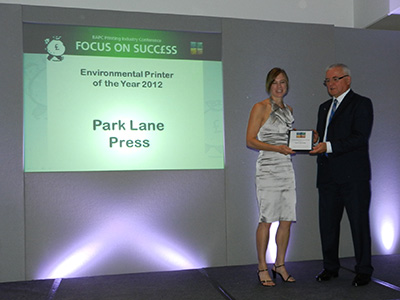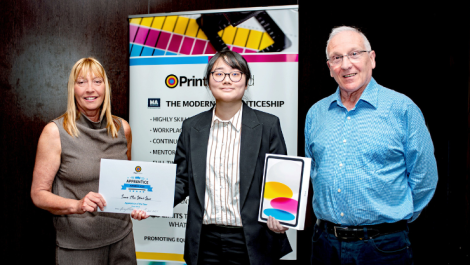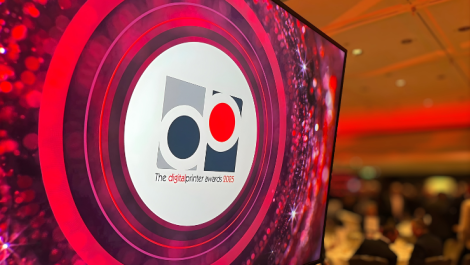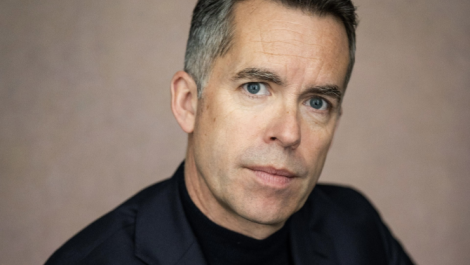Above: Libby Ferguson of Park Lane Press being presented the award by Pat Holloway from Kodak.
The BAPC (British Association for Print and Communication) held its annual conference and awards in Borehamwood last weekend.
The award winners were:
Business of the Year – Kall Kwik, Bury St Edmunds
Environmental Printer of the Year – Park Lane Press
Supplier of the Year – Ricoh
Product of the Year – Canon imagePress 7010VP
Speakers at the conference included Barney Cox from research company InfoTrends, who explained the results of recent surveys indicating that high speed digital web colour presses are set to see major growths in sales in the next few years, particularly to handle a switch in transactional work from offset. High end digital colour presses (using presses such as the Xerox iGen and Kodak NexPress sheet-fed machines, or inkjet webs) is seeing strong growth (27% compound annual growth), though digital monochrome seems to be static and offset is starting to decline, he said. ‘We see a dramatic switch from continuous toner to inkjet,’ he said. ‘This is as digital takes pages from analogue printing, for markets such as books, direct mail, newspapers, magazines and newsletters, in shorter, targeted runs.’
However, he identified a threat to printing in general as competition from other media might lead to a ‘fight to the bottom,’ ie price cutting rather than increased services. One effect will be ever increasing interest in automation to cut production costs. More hopefully, new media may open new markets for print too, as well as niche applications made possible by digital printing, such as photo products. While some printers may reinvent themselves as cross media ‘marketing service providers,’ not all types of print are suited to this, he pointed out. Successful cross media marketing campaigns will use mixed media, ie print plus other methods, and not either/or, he predicted.
Mark Lawn, Canon’s European marketing director, explained the results of the company’s recent Insight Report, which surveyed attitudes and awareness among print buyers to digital and other print technologies. Chas Moloney, marketing director of Ricoh UK, provided some useful marketing tips for printers to promote themselves and their businesses. Nick Devine, the ‘Print Coach,’ gave one of his inspirational talks on more effective selling techniques, pointing out that a BPIF survey concluded that while the majority of printers are reporting dramatically falling profits on more gently declining sales, some 11% of respondents have been able to increase prices by adding new products and services. This is a preferable way ahead, he pointed out.
Stan Lemmens from Belgian public relations company Duomedia has long experience in marketing for print software developers EskoArtwork and Artwork Systems. He provided a run-down of the potential benefits of promoting your business (and yourself) through social media.
Kevin O’Donnell, graphic communications marketing manager of Xerox UK, also plugged the benefits of social media. Join FaceBook, Twitter, LinkedIn etc, he said, and listen to what your customers are saying there, before joining in, he advised. His theme was the psychological ‘Rule of 3,’ where people seem to remember messages that are grouped in threes rather than twos or fours. ‘Education, education, education’ and all that.
Simon Casejuana, who has worked with EFI for 15 years, explained the benefits of wide format as a new market opportunity for wide format printers. It allows them to ‘own the contract,’ he asserted, meaning that customers who need a range of print including documents and signage can get them all from one supplier, while the supplier can save by not having to outsource the wide format jobs. Some 50% of large format printers offer trade services to other printers, another potential revenue source.
He said that according to Widthwise, a UK survey of 227 respondents, wide format print margins are the highest in the printing industry. 90% already had wide format, and about 50% expect to buy a new wide format printer within two years. However, said Mr Casejuana, ‘Print is the easy bit.’ Finishing and signage erection are the more difficult and time consuming aspects of wide format work. As with other processes, the capital costs of printers are only a minor factor compared with the costs of consumables such as ink and media.
Nigel Toplis is managing director of franchising owner The Bardon Group, which took over the master franchise of Kall Kwik last year. He revealed plans to relaunch Kall Kwik early next year as a marketing services specialist, offering small businesses a much wider range of services. ‘We won’t be providing just print,’ he said, ‘we’ll be providing communications.’
Contact: www.bapc.co.uk





